On-the-Job vs. Off-the-Job Training in Hotel Industry
VerifiedAdded on 2019/12/28
|69
|19869
|177
Report
AI Summary
This report investigates the effectiveness of on-the-job versus off-the-job training methods on employee performance within the UK hotel industry. The research explores various training techniques employed in the hospitality sector, aiming to evaluate their impact on employee productivity and skills development. The study employs an exploratory research design with an inductive approach, utilizing both primary and secondary data sources. Primary data was collected from 50 employees in UK hotels using a simple random sampling method, and qualitative data analysis techniques were used to interpret the findings. The results highlight the effectiveness of both training methods, emphasizing the importance of selecting the appropriate method based on specific needs and situational contexts. The report provides a detailed literature review on training and development, staff training in the UK hotel industry, and factors affecting training effectiveness. The research methodology, including research design, philosophy, approach, data collection, sampling techniques, and ethical considerations, is thoroughly described. The report concludes with recommendations for selecting suitable training methods to improve employee performance and identifies limitations of the study along with suggestions for future research.
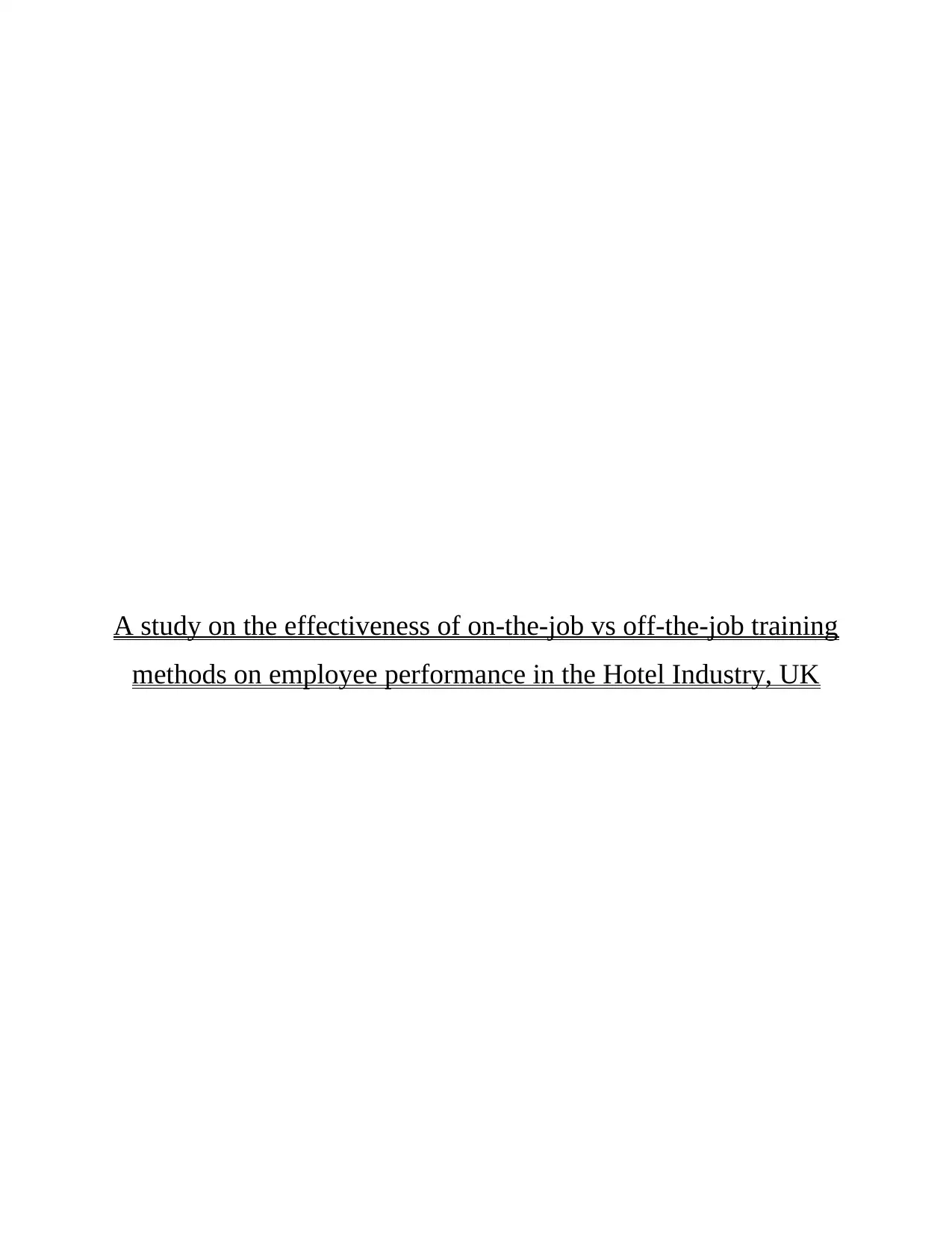
A study on the effectiveness of on-the-job vs off-the-job training
methods on employee performance in the Hotel Industry, UK
methods on employee performance in the Hotel Industry, UK
Paraphrase This Document
Need a fresh take? Get an instant paraphrase of this document with our AI Paraphraser
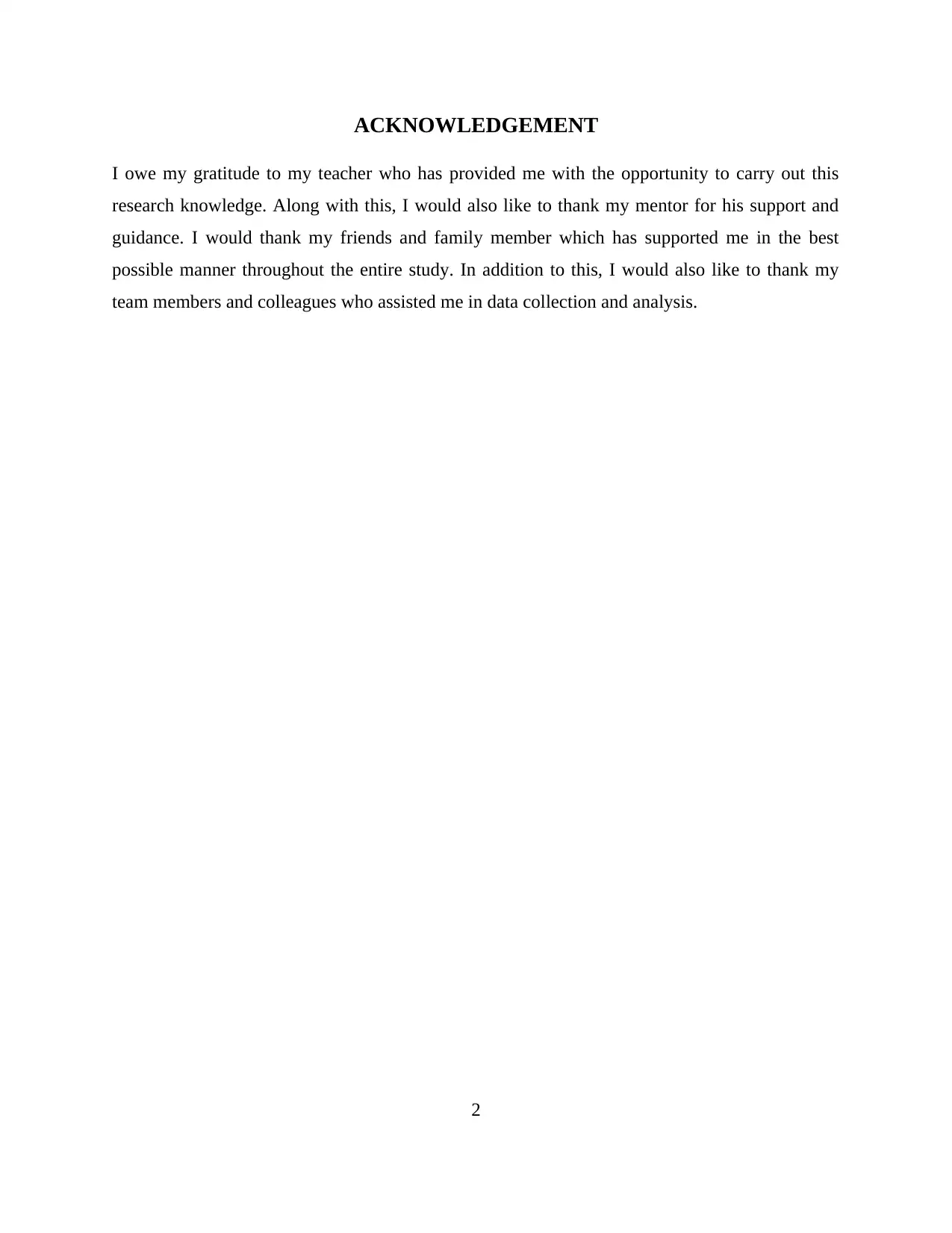
ACKNOWLEDGEMENT
I owe my gratitude to my teacher who has provided me with the opportunity to carry out this
research knowledge. Along with this, I would also like to thank my mentor for his support and
guidance. I would thank my friends and family member which has supported me in the best
possible manner throughout the entire study. In addition to this, I would also like to thank my
team members and colleagues who assisted me in data collection and analysis.
2
I owe my gratitude to my teacher who has provided me with the opportunity to carry out this
research knowledge. Along with this, I would also like to thank my mentor for his support and
guidance. I would thank my friends and family member which has supported me in the best
possible manner throughout the entire study. In addition to this, I would also like to thank my
team members and colleagues who assisted me in data collection and analysis.
2
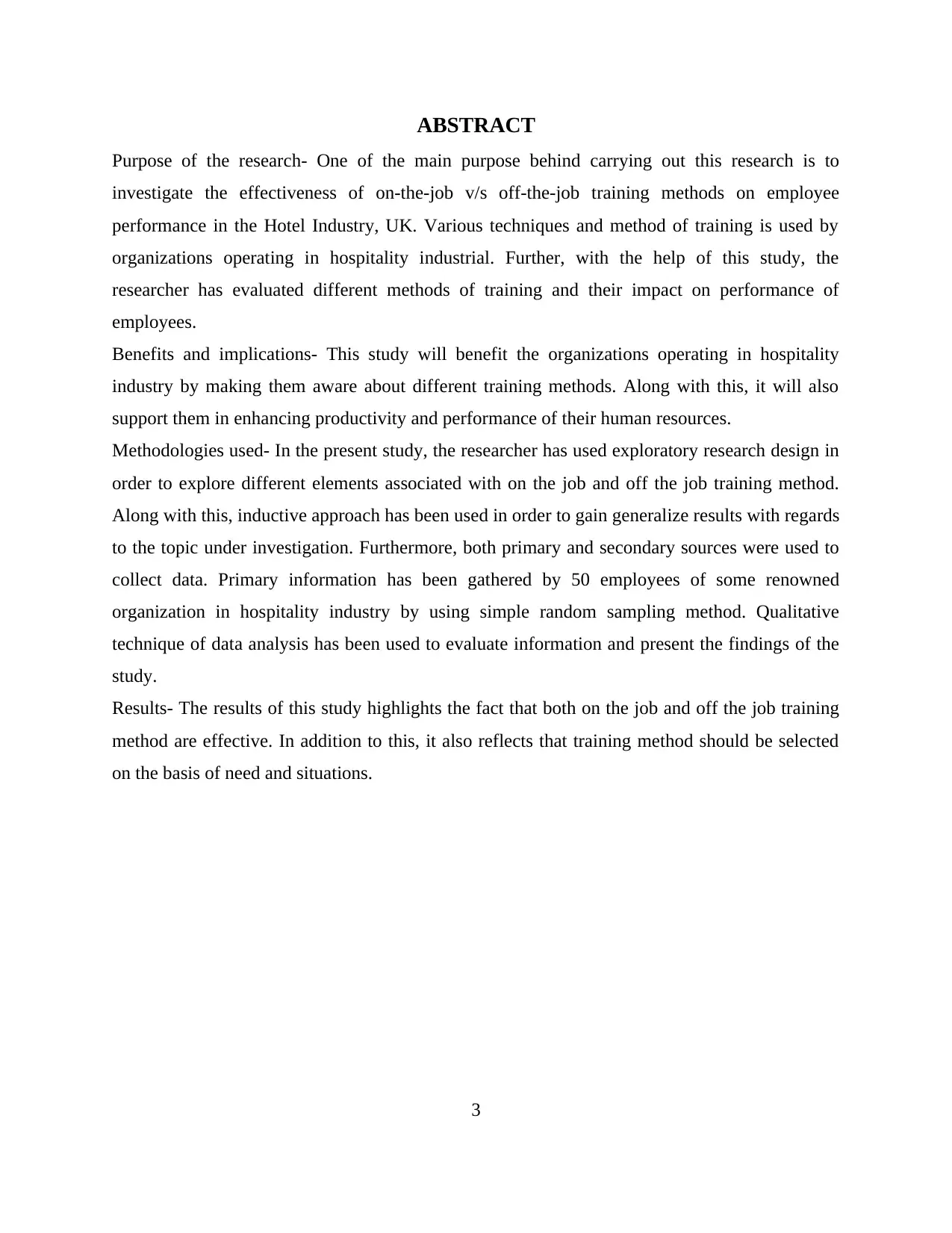
ABSTRACT
Purpose of the research- One of the main purpose behind carrying out this research is to
investigate the effectiveness of on-the-job v/s off-the-job training methods on employee
performance in the Hotel Industry, UK. Various techniques and method of training is used by
organizations operating in hospitality industrial. Further, with the help of this study, the
researcher has evaluated different methods of training and their impact on performance of
employees.
Benefits and implications- This study will benefit the organizations operating in hospitality
industry by making them aware about different training methods. Along with this, it will also
support them in enhancing productivity and performance of their human resources.
Methodologies used- In the present study, the researcher has used exploratory research design in
order to explore different elements associated with on the job and off the job training method.
Along with this, inductive approach has been used in order to gain generalize results with regards
to the topic under investigation. Furthermore, both primary and secondary sources were used to
collect data. Primary information has been gathered by 50 employees of some renowned
organization in hospitality industry by using simple random sampling method. Qualitative
technique of data analysis has been used to evaluate information and present the findings of the
study.
Results- The results of this study highlights the fact that both on the job and off the job training
method are effective. In addition to this, it also reflects that training method should be selected
on the basis of need and situations.
3
Purpose of the research- One of the main purpose behind carrying out this research is to
investigate the effectiveness of on-the-job v/s off-the-job training methods on employee
performance in the Hotel Industry, UK. Various techniques and method of training is used by
organizations operating in hospitality industrial. Further, with the help of this study, the
researcher has evaluated different methods of training and their impact on performance of
employees.
Benefits and implications- This study will benefit the organizations operating in hospitality
industry by making them aware about different training methods. Along with this, it will also
support them in enhancing productivity and performance of their human resources.
Methodologies used- In the present study, the researcher has used exploratory research design in
order to explore different elements associated with on the job and off the job training method.
Along with this, inductive approach has been used in order to gain generalize results with regards
to the topic under investigation. Furthermore, both primary and secondary sources were used to
collect data. Primary information has been gathered by 50 employees of some renowned
organization in hospitality industry by using simple random sampling method. Qualitative
technique of data analysis has been used to evaluate information and present the findings of the
study.
Results- The results of this study highlights the fact that both on the job and off the job training
method are effective. In addition to this, it also reflects that training method should be selected
on the basis of need and situations.
3
⊘ This is a preview!⊘
Do you want full access?
Subscribe today to unlock all pages.

Trusted by 1+ million students worldwide
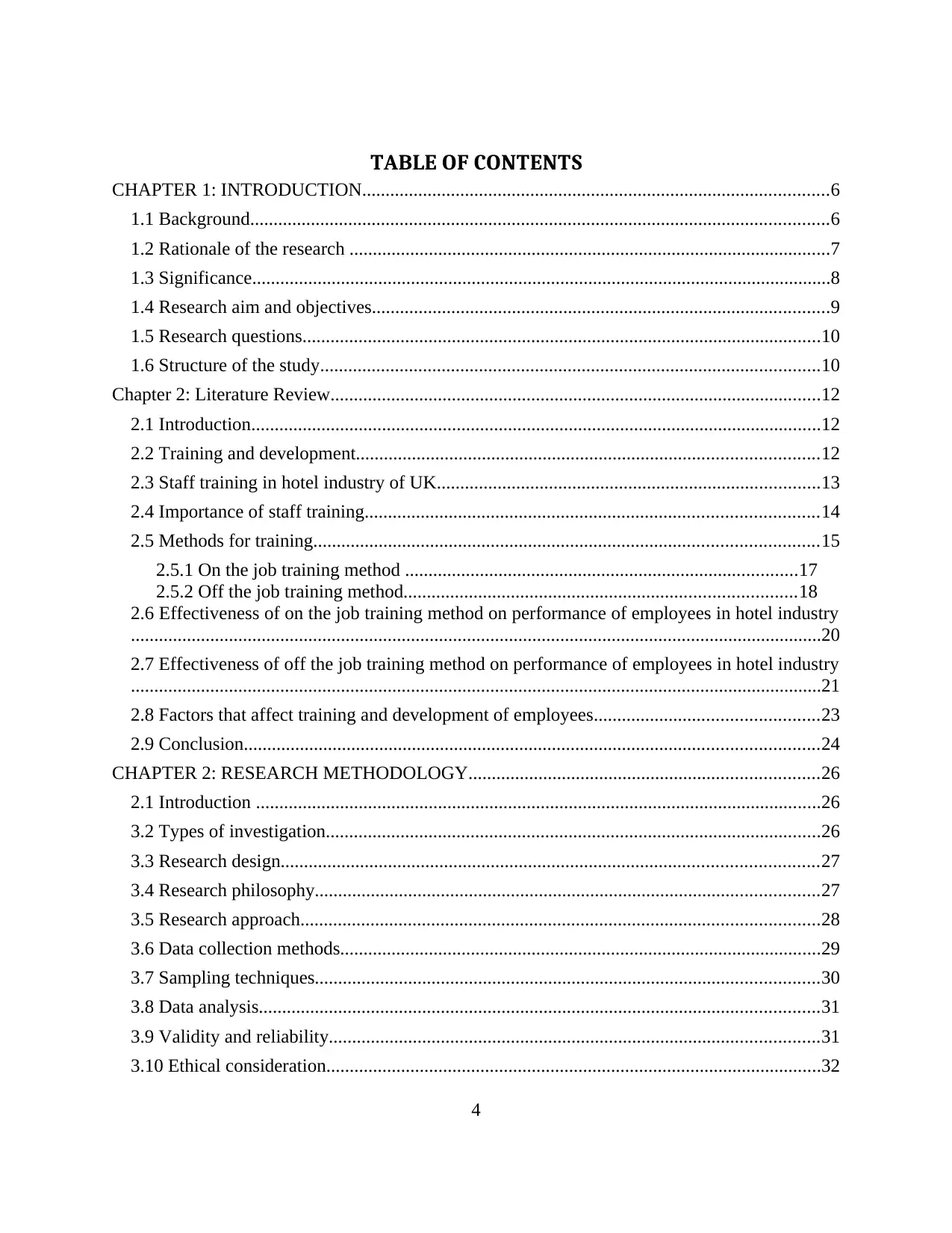
TABLE OF CONTENTS
CHAPTER 1: INTRODUCTION....................................................................................................6
1.1 Background............................................................................................................................6
1.2 Rationale of the research .......................................................................................................7
1.3 Significance............................................................................................................................8
1.4 Research aim and objectives..................................................................................................9
1.5 Research questions...............................................................................................................10
1.6 Structure of the study...........................................................................................................10
Chapter 2: Literature Review.........................................................................................................12
2.1 Introduction..........................................................................................................................12
2.2 Training and development...................................................................................................12
2.3 Staff training in hotel industry of UK..................................................................................13
2.4 Importance of staff training.................................................................................................14
2.5 Methods for training............................................................................................................15
2.5.1 On the job training method ....................................................................................17
2.5.2 Off the job training method....................................................................................18
2.6 Effectiveness of on the job training method on performance of employees in hotel industry
....................................................................................................................................................20
2.7 Effectiveness of off the job training method on performance of employees in hotel industry
....................................................................................................................................................21
2.8 Factors that affect training and development of employees................................................23
2.9 Conclusion...........................................................................................................................24
CHAPTER 2: RESEARCH METHODOLOGY...........................................................................26
2.1 Introduction .........................................................................................................................26
3.2 Types of investigation..........................................................................................................26
3.3 Research design...................................................................................................................27
3.4 Research philosophy............................................................................................................27
3.5 Research approach...............................................................................................................28
3.6 Data collection methods.......................................................................................................29
3.7 Sampling techniques............................................................................................................30
3.8 Data analysis........................................................................................................................31
3.9 Validity and reliability.........................................................................................................31
3.10 Ethical consideration..........................................................................................................32
4
CHAPTER 1: INTRODUCTION....................................................................................................6
1.1 Background............................................................................................................................6
1.2 Rationale of the research .......................................................................................................7
1.3 Significance............................................................................................................................8
1.4 Research aim and objectives..................................................................................................9
1.5 Research questions...............................................................................................................10
1.6 Structure of the study...........................................................................................................10
Chapter 2: Literature Review.........................................................................................................12
2.1 Introduction..........................................................................................................................12
2.2 Training and development...................................................................................................12
2.3 Staff training in hotel industry of UK..................................................................................13
2.4 Importance of staff training.................................................................................................14
2.5 Methods for training............................................................................................................15
2.5.1 On the job training method ....................................................................................17
2.5.2 Off the job training method....................................................................................18
2.6 Effectiveness of on the job training method on performance of employees in hotel industry
....................................................................................................................................................20
2.7 Effectiveness of off the job training method on performance of employees in hotel industry
....................................................................................................................................................21
2.8 Factors that affect training and development of employees................................................23
2.9 Conclusion...........................................................................................................................24
CHAPTER 2: RESEARCH METHODOLOGY...........................................................................26
2.1 Introduction .........................................................................................................................26
3.2 Types of investigation..........................................................................................................26
3.3 Research design...................................................................................................................27
3.4 Research philosophy............................................................................................................27
3.5 Research approach...............................................................................................................28
3.6 Data collection methods.......................................................................................................29
3.7 Sampling techniques............................................................................................................30
3.8 Data analysis........................................................................................................................31
3.9 Validity and reliability.........................................................................................................31
3.10 Ethical consideration..........................................................................................................32
4
Paraphrase This Document
Need a fresh take? Get an instant paraphrase of this document with our AI Paraphraser
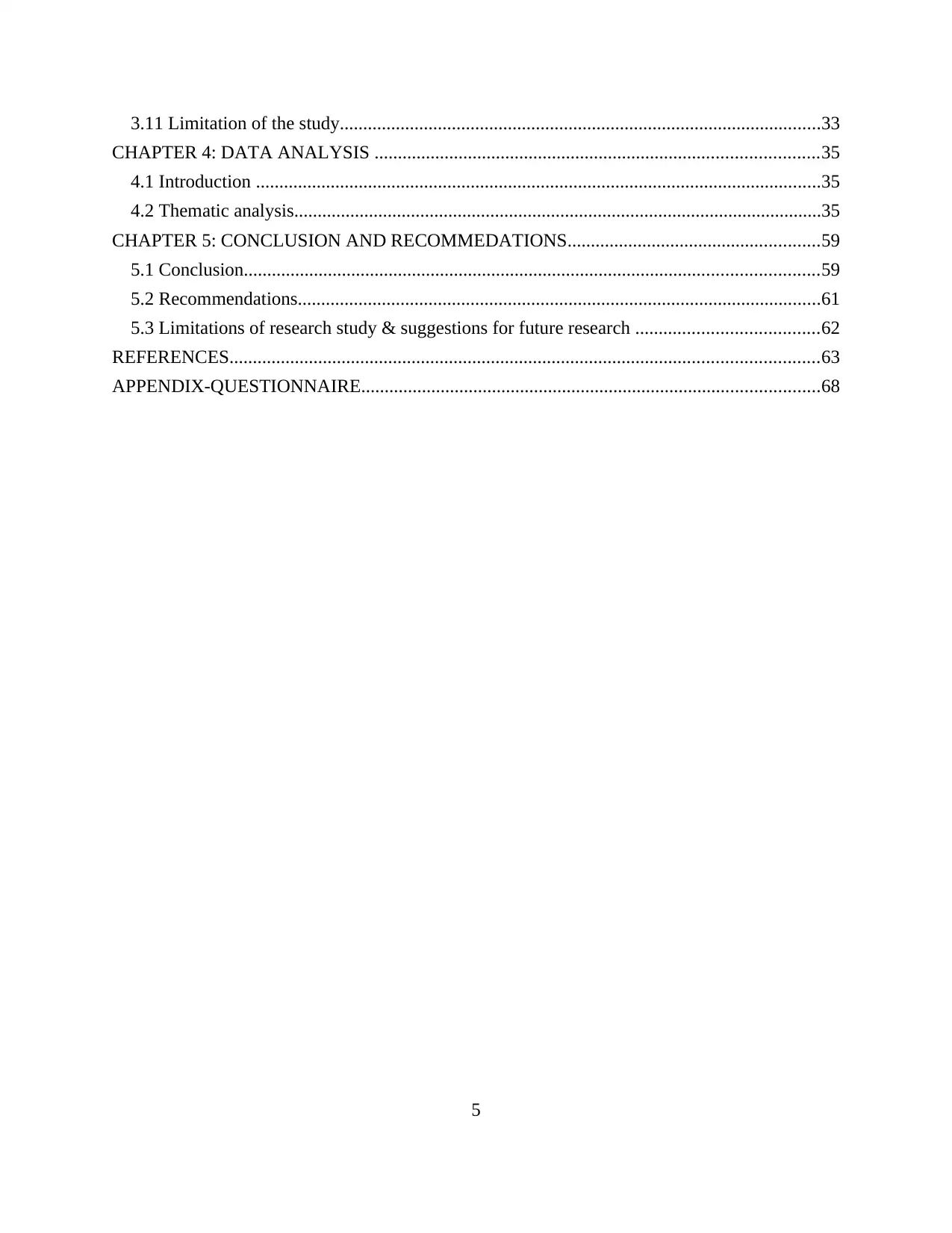
3.11 Limitation of the study.......................................................................................................33
CHAPTER 4: DATA ANALYSIS ...............................................................................................35
4.1 Introduction .........................................................................................................................35
4.2 Thematic analysis.................................................................................................................35
CHAPTER 5: CONCLUSION AND RECOMMEDATIONS......................................................59
5.1 Conclusion...........................................................................................................................59
5.2 Recommendations................................................................................................................61
5.3 Limitations of research study & suggestions for future research .......................................62
REFERENCES..............................................................................................................................63
APPENDIX-QUESTIONNAIRE..................................................................................................68
5
CHAPTER 4: DATA ANALYSIS ...............................................................................................35
4.1 Introduction .........................................................................................................................35
4.2 Thematic analysis.................................................................................................................35
CHAPTER 5: CONCLUSION AND RECOMMEDATIONS......................................................59
5.1 Conclusion...........................................................................................................................59
5.2 Recommendations................................................................................................................61
5.3 Limitations of research study & suggestions for future research .......................................62
REFERENCES..............................................................................................................................63
APPENDIX-QUESTIONNAIRE..................................................................................................68
5
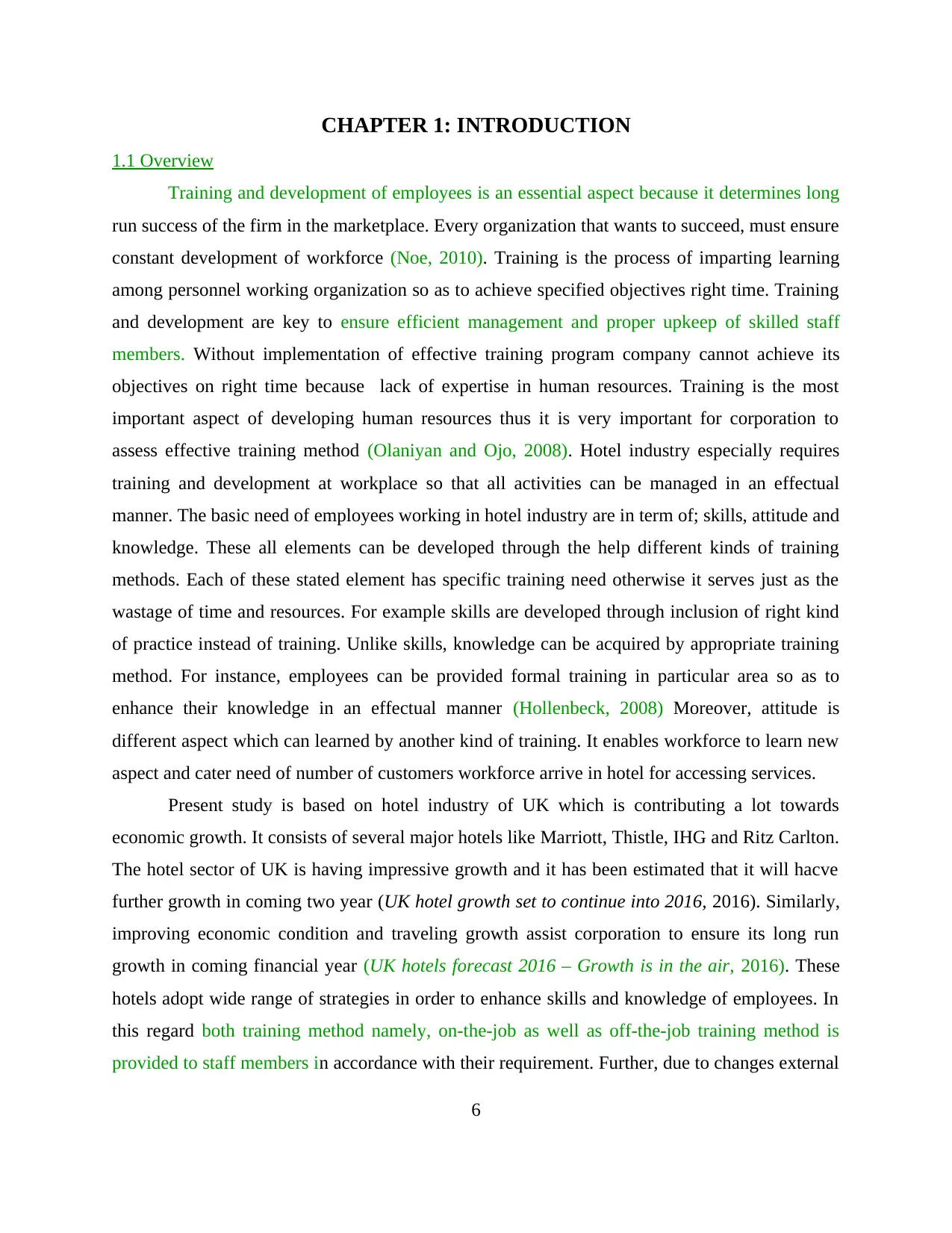
CHAPTER 1: INTRODUCTION
1.1 Overview
Training and development of employees is an essential aspect because it determines long
run success of the firm in the marketplace. Every organization that wants to succeed, must ensure
constant development of workforce (Noe, 2010). Training is the process of imparting learning
among personnel working organization so as to achieve specified objectives right time. Training
and development are key to ensure efficient management and proper upkeep of skilled staff
members. Without implementation of effective training program company cannot achieve its
objectives on right time because lack of expertise in human resources. Training is the most
important aspect of developing human resources thus it is very important for corporation to
assess effective training method (Olaniyan and Ojo, 2008). Hotel industry especially requires
training and development at workplace so that all activities can be managed in an effectual
manner. The basic need of employees working in hotel industry are in term of; skills, attitude and
knowledge. These all elements can be developed through the help different kinds of training
methods. Each of these stated element has specific training need otherwise it serves just as the
wastage of time and resources. For example skills are developed through inclusion of right kind
of practice instead of training. Unlike skills, knowledge can be acquired by appropriate training
method. For instance, employees can be provided formal training in particular area so as to
enhance their knowledge in an effectual manner (Hollenbeck, 2008) Moreover, attitude is
different aspect which can learned by another kind of training. It enables workforce to learn new
aspect and cater need of number of customers workforce arrive in hotel for accessing services.
Present study is based on hotel industry of UK which is contributing a lot towards
economic growth. It consists of several major hotels like Marriott, Thistle, IHG and Ritz Carlton.
The hotel sector of UK is having impressive growth and it has been estimated that it will hacve
further growth in coming two year (UK hotel growth set to continue into 2016, 2016). Similarly,
improving economic condition and traveling growth assist corporation to ensure its long run
growth in coming financial year (UK hotels forecast 2016 – Growth is in the air, 2016). These
hotels adopt wide range of strategies in order to enhance skills and knowledge of employees. In
this regard both training method namely, on-the-job as well as off-the-job training method is
provided to staff members in accordance with their requirement. Further, due to changes external
6
1.1 Overview
Training and development of employees is an essential aspect because it determines long
run success of the firm in the marketplace. Every organization that wants to succeed, must ensure
constant development of workforce (Noe, 2010). Training is the process of imparting learning
among personnel working organization so as to achieve specified objectives right time. Training
and development are key to ensure efficient management and proper upkeep of skilled staff
members. Without implementation of effective training program company cannot achieve its
objectives on right time because lack of expertise in human resources. Training is the most
important aspect of developing human resources thus it is very important for corporation to
assess effective training method (Olaniyan and Ojo, 2008). Hotel industry especially requires
training and development at workplace so that all activities can be managed in an effectual
manner. The basic need of employees working in hotel industry are in term of; skills, attitude and
knowledge. These all elements can be developed through the help different kinds of training
methods. Each of these stated element has specific training need otherwise it serves just as the
wastage of time and resources. For example skills are developed through inclusion of right kind
of practice instead of training. Unlike skills, knowledge can be acquired by appropriate training
method. For instance, employees can be provided formal training in particular area so as to
enhance their knowledge in an effectual manner (Hollenbeck, 2008) Moreover, attitude is
different aspect which can learned by another kind of training. It enables workforce to learn new
aspect and cater need of number of customers workforce arrive in hotel for accessing services.
Present study is based on hotel industry of UK which is contributing a lot towards
economic growth. It consists of several major hotels like Marriott, Thistle, IHG and Ritz Carlton.
The hotel sector of UK is having impressive growth and it has been estimated that it will hacve
further growth in coming two year (UK hotel growth set to continue into 2016, 2016). Similarly,
improving economic condition and traveling growth assist corporation to ensure its long run
growth in coming financial year (UK hotels forecast 2016 – Growth is in the air, 2016). These
hotels adopt wide range of strategies in order to enhance skills and knowledge of employees. In
this regard both training method namely, on-the-job as well as off-the-job training method is
provided to staff members in accordance with their requirement. Further, due to changes external
6
⊘ This is a preview!⊘
Do you want full access?
Subscribe today to unlock all pages.

Trusted by 1+ million students worldwide
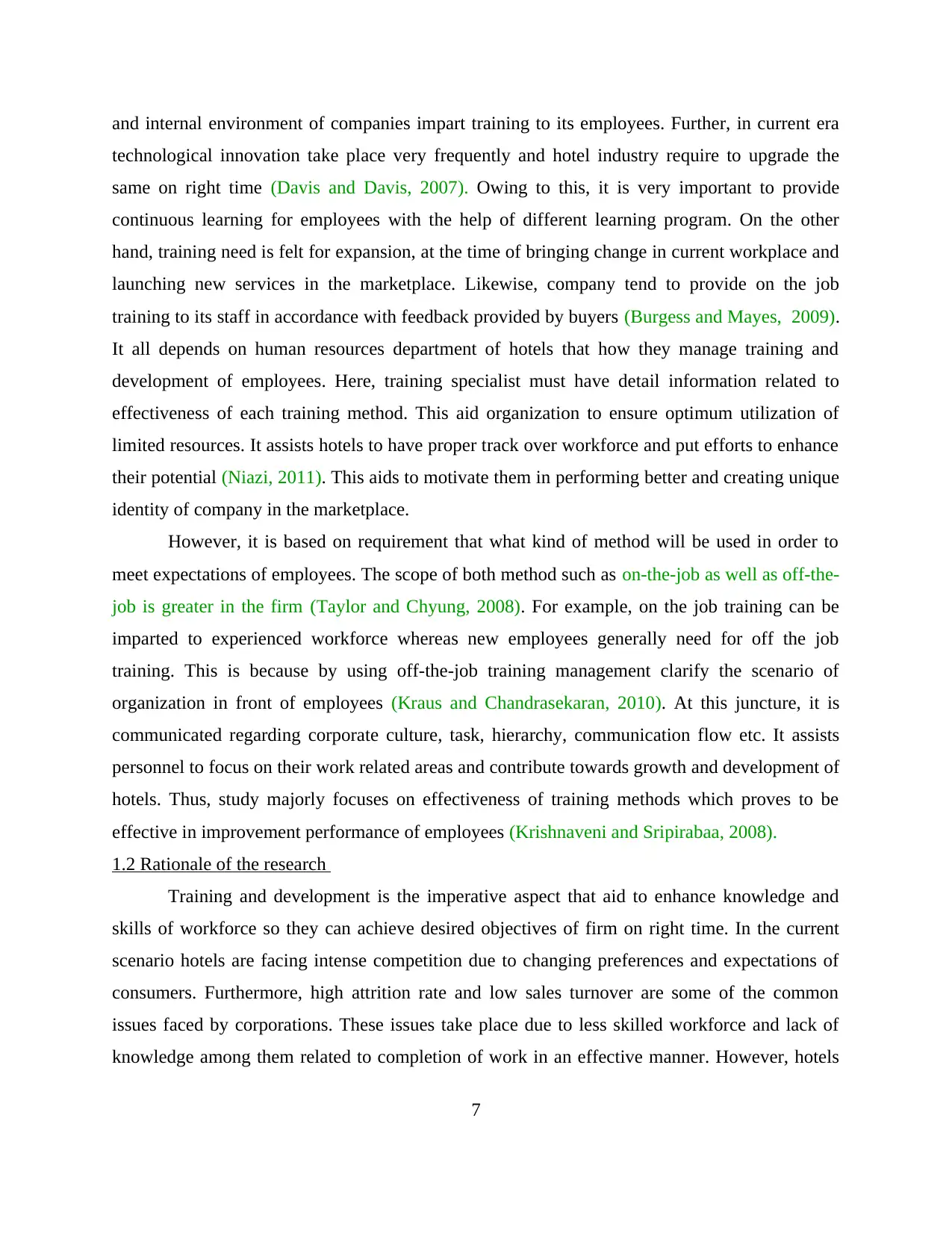
and internal environment of companies impart training to its employees. Further, in current era
technological innovation take place very frequently and hotel industry require to upgrade the
same on right time (Davis and Davis, 2007). Owing to this, it is very important to provide
continuous learning for employees with the help of different learning program. On the other
hand, training need is felt for expansion, at the time of bringing change in current workplace and
launching new services in the marketplace. Likewise, company tend to provide on the job
training to its staff in accordance with feedback provided by buyers (Burgess and Mayes, 2009).
It all depends on human resources department of hotels that how they manage training and
development of employees. Here, training specialist must have detail information related to
effectiveness of each training method. This aid organization to ensure optimum utilization of
limited resources. It assists hotels to have proper track over workforce and put efforts to enhance
their potential (Niazi, 2011). This aids to motivate them in performing better and creating unique
identity of company in the marketplace.
However, it is based on requirement that what kind of method will be used in order to
meet expectations of employees. The scope of both method such as on-the-job as well as off-the-
job is greater in the firm (Taylor and Chyung, 2008). For example, on the job training can be
imparted to experienced workforce whereas new employees generally need for off the job
training. This is because by using off-the-job training management clarify the scenario of
organization in front of employees (Kraus and Chandrasekaran, 2010). At this juncture, it is
communicated regarding corporate culture, task, hierarchy, communication flow etc. It assists
personnel to focus on their work related areas and contribute towards growth and development of
hotels. Thus, study majorly focuses on effectiveness of training methods which proves to be
effective in improvement performance of employees (Krishnaveni and Sripirabaa, 2008).
1.2 Rationale of the research
Training and development is the imperative aspect that aid to enhance knowledge and
skills of workforce so they can achieve desired objectives of firm on right time. In the current
scenario hotels are facing intense competition due to changing preferences and expectations of
consumers. Furthermore, high attrition rate and low sales turnover are some of the common
issues faced by corporations. These issues take place due to less skilled workforce and lack of
knowledge among them related to completion of work in an effective manner. However, hotels
7
technological innovation take place very frequently and hotel industry require to upgrade the
same on right time (Davis and Davis, 2007). Owing to this, it is very important to provide
continuous learning for employees with the help of different learning program. On the other
hand, training need is felt for expansion, at the time of bringing change in current workplace and
launching new services in the marketplace. Likewise, company tend to provide on the job
training to its staff in accordance with feedback provided by buyers (Burgess and Mayes, 2009).
It all depends on human resources department of hotels that how they manage training and
development of employees. Here, training specialist must have detail information related to
effectiveness of each training method. This aid organization to ensure optimum utilization of
limited resources. It assists hotels to have proper track over workforce and put efforts to enhance
their potential (Niazi, 2011). This aids to motivate them in performing better and creating unique
identity of company in the marketplace.
However, it is based on requirement that what kind of method will be used in order to
meet expectations of employees. The scope of both method such as on-the-job as well as off-the-
job is greater in the firm (Taylor and Chyung, 2008). For example, on the job training can be
imparted to experienced workforce whereas new employees generally need for off the job
training. This is because by using off-the-job training management clarify the scenario of
organization in front of employees (Kraus and Chandrasekaran, 2010). At this juncture, it is
communicated regarding corporate culture, task, hierarchy, communication flow etc. It assists
personnel to focus on their work related areas and contribute towards growth and development of
hotels. Thus, study majorly focuses on effectiveness of training methods which proves to be
effective in improvement performance of employees (Krishnaveni and Sripirabaa, 2008).
1.2 Rationale of the research
Training and development is the imperative aspect that aid to enhance knowledge and
skills of workforce so they can achieve desired objectives of firm on right time. In the current
scenario hotels are facing intense competition due to changing preferences and expectations of
consumers. Furthermore, high attrition rate and low sales turnover are some of the common
issues faced by corporations. These issues take place due to less skilled workforce and lack of
knowledge among them related to completion of work in an effective manner. However, hotels
7
Paraphrase This Document
Need a fresh take? Get an instant paraphrase of this document with our AI Paraphraser
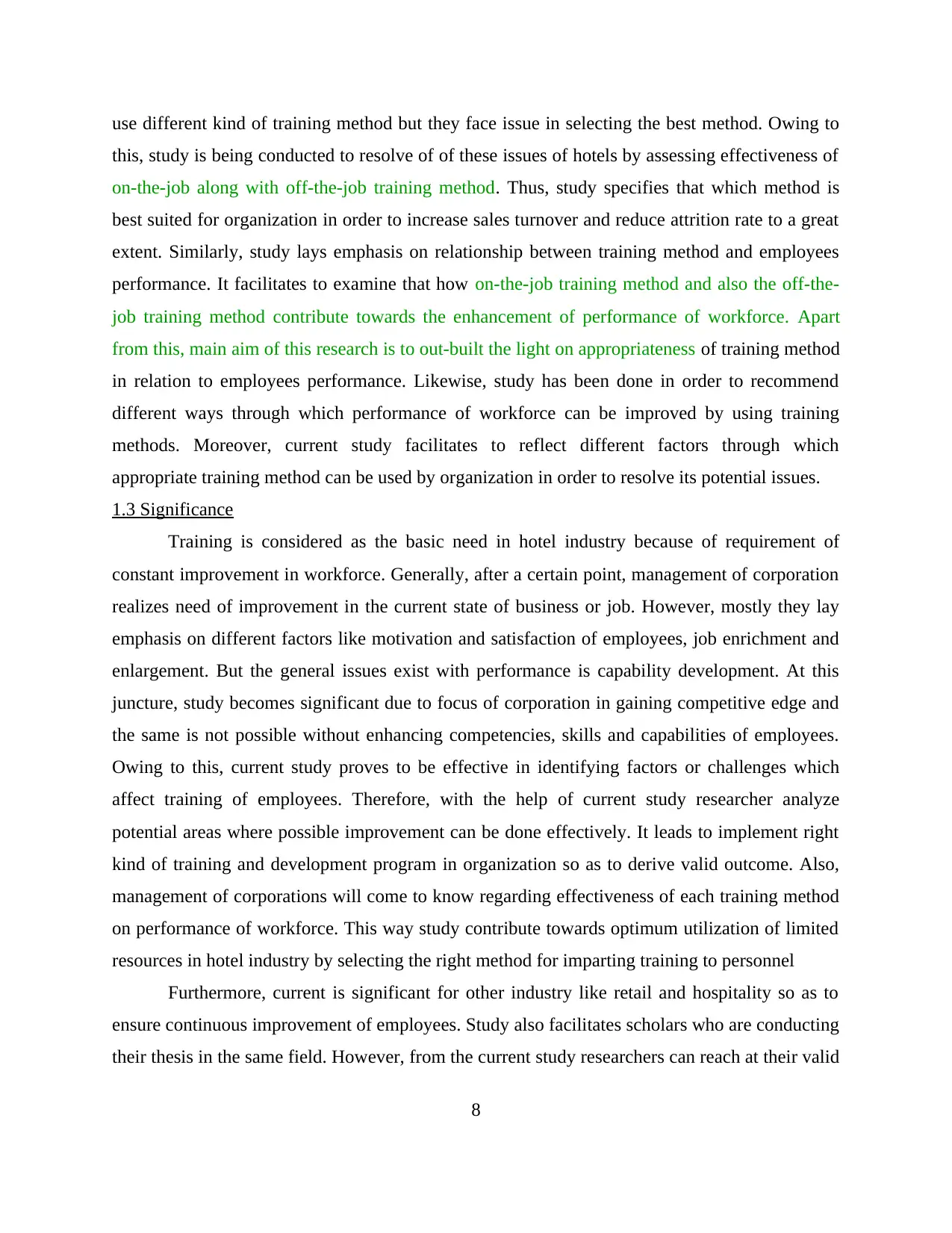
use different kind of training method but they face issue in selecting the best method. Owing to
this, study is being conducted to resolve of of these issues of hotels by assessing effectiveness of
on-the-job along with off-the-job training method. Thus, study specifies that which method is
best suited for organization in order to increase sales turnover and reduce attrition rate to a great
extent. Similarly, study lays emphasis on relationship between training method and employees
performance. It facilitates to examine that how on-the-job training method and also the off-the-
job training method contribute towards the enhancement of performance of workforce. Apart
from this, main aim of this research is to out-built the light on appropriateness of training method
in relation to employees performance. Likewise, study has been done in order to recommend
different ways through which performance of workforce can be improved by using training
methods. Moreover, current study facilitates to reflect different factors through which
appropriate training method can be used by organization in order to resolve its potential issues.
1.3 Significance
Training is considered as the basic need in hotel industry because of requirement of
constant improvement in workforce. Generally, after a certain point, management of corporation
realizes need of improvement in the current state of business or job. However, mostly they lay
emphasis on different factors like motivation and satisfaction of employees, job enrichment and
enlargement. But the general issues exist with performance is capability development. At this
juncture, study becomes significant due to focus of corporation in gaining competitive edge and
the same is not possible without enhancing competencies, skills and capabilities of employees.
Owing to this, current study proves to be effective in identifying factors or challenges which
affect training of employees. Therefore, with the help of current study researcher analyze
potential areas where possible improvement can be done effectively. It leads to implement right
kind of training and development program in organization so as to derive valid outcome. Also,
management of corporations will come to know regarding effectiveness of each training method
on performance of workforce. This way study contribute towards optimum utilization of limited
resources in hotel industry by selecting the right method for imparting training to personnel
Furthermore, current is significant for other industry like retail and hospitality so as to
ensure continuous improvement of employees. Study also facilitates scholars who are conducting
their thesis in the same field. However, from the current study researchers can reach at their valid
8
this, study is being conducted to resolve of of these issues of hotels by assessing effectiveness of
on-the-job along with off-the-job training method. Thus, study specifies that which method is
best suited for organization in order to increase sales turnover and reduce attrition rate to a great
extent. Similarly, study lays emphasis on relationship between training method and employees
performance. It facilitates to examine that how on-the-job training method and also the off-the-
job training method contribute towards the enhancement of performance of workforce. Apart
from this, main aim of this research is to out-built the light on appropriateness of training method
in relation to employees performance. Likewise, study has been done in order to recommend
different ways through which performance of workforce can be improved by using training
methods. Moreover, current study facilitates to reflect different factors through which
appropriate training method can be used by organization in order to resolve its potential issues.
1.3 Significance
Training is considered as the basic need in hotel industry because of requirement of
constant improvement in workforce. Generally, after a certain point, management of corporation
realizes need of improvement in the current state of business or job. However, mostly they lay
emphasis on different factors like motivation and satisfaction of employees, job enrichment and
enlargement. But the general issues exist with performance is capability development. At this
juncture, study becomes significant due to focus of corporation in gaining competitive edge and
the same is not possible without enhancing competencies, skills and capabilities of employees.
Owing to this, current study proves to be effective in identifying factors or challenges which
affect training of employees. Therefore, with the help of current study researcher analyze
potential areas where possible improvement can be done effectively. It leads to implement right
kind of training and development program in organization so as to derive valid outcome. Also,
management of corporations will come to know regarding effectiveness of each training method
on performance of workforce. This way study contribute towards optimum utilization of limited
resources in hotel industry by selecting the right method for imparting training to personnel
Furthermore, current is significant for other industry like retail and hospitality so as to
ensure continuous improvement of employees. Study also facilitates scholars who are conducting
their thesis in the same field. However, from the current study researchers can reach at their valid
8
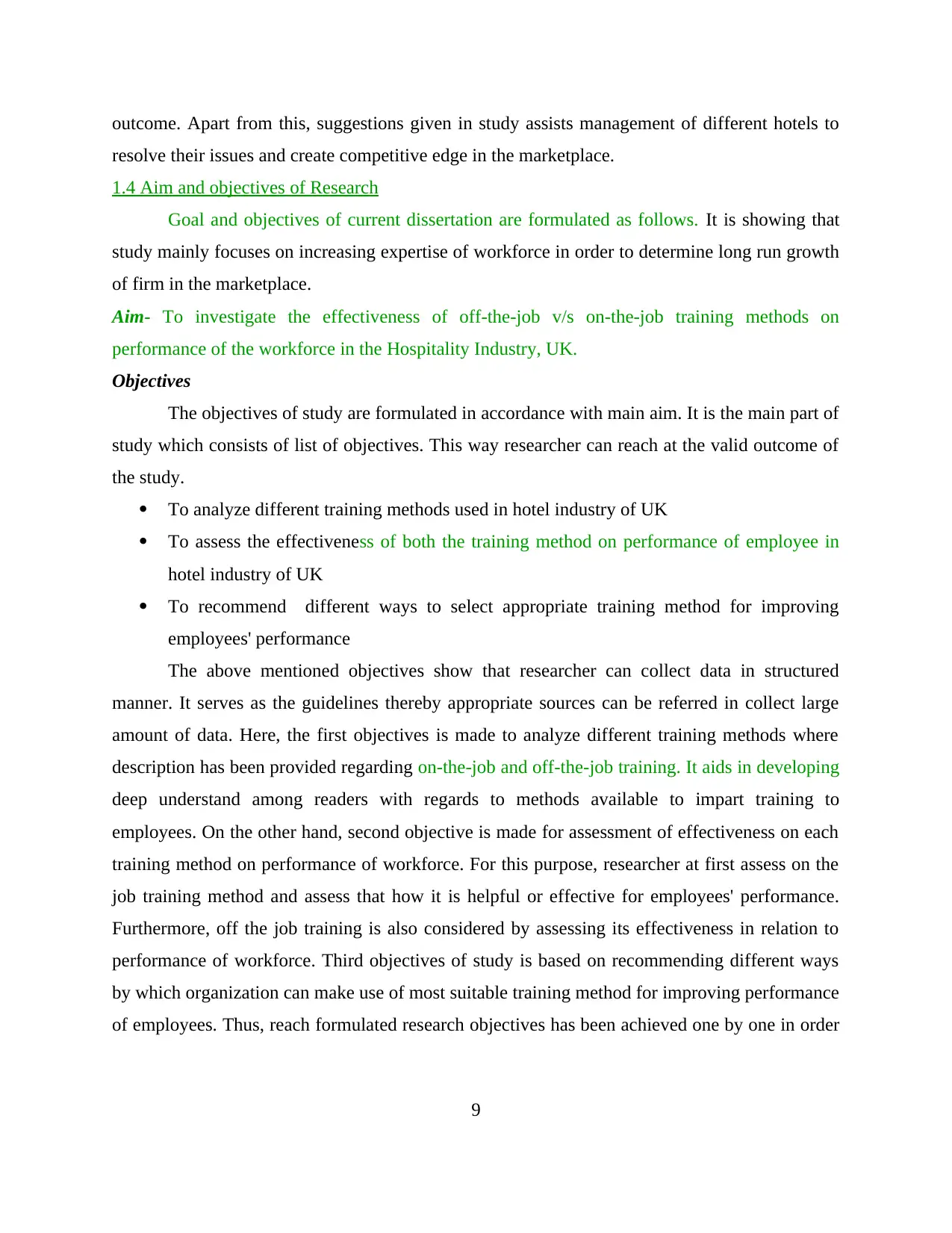
outcome. Apart from this, suggestions given in study assists management of different hotels to
resolve their issues and create competitive edge in the marketplace.
1.4 Aim and objectives of Research
Goal and objectives of current dissertation are formulated as follows. It is showing that
study mainly focuses on increasing expertise of workforce in order to determine long run growth
of firm in the marketplace.
Aim- To investigate the effectiveness of off-the-job v/s on-the-job training methods on
performance of the workforce in the Hospitality Industry, UK.
Objectives
The objectives of study are formulated in accordance with main aim. It is the main part of
study which consists of list of objectives. This way researcher can reach at the valid outcome of
the study.
To analyze different training methods used in hotel industry of UK
To assess the effectiveness of both the training method on performance of employee in
hotel industry of UK
To recommend different ways to select appropriate training method for improving
employees' performance
The above mentioned objectives show that researcher can collect data in structured
manner. It serves as the guidelines thereby appropriate sources can be referred in collect large
amount of data. Here, the first objectives is made to analyze different training methods where
description has been provided regarding on-the-job and off-the-job training. It aids in developing
deep understand among readers with regards to methods available to impart training to
employees. On the other hand, second objective is made for assessment of effectiveness on each
training method on performance of workforce. For this purpose, researcher at first assess on the
job training method and assess that how it is helpful or effective for employees' performance.
Furthermore, off the job training is also considered by assessing its effectiveness in relation to
performance of workforce. Third objectives of study is based on recommending different ways
by which organization can make use of most suitable training method for improving performance
of employees. Thus, reach formulated research objectives has been achieved one by one in order
9
resolve their issues and create competitive edge in the marketplace.
1.4 Aim and objectives of Research
Goal and objectives of current dissertation are formulated as follows. It is showing that
study mainly focuses on increasing expertise of workforce in order to determine long run growth
of firm in the marketplace.
Aim- To investigate the effectiveness of off-the-job v/s on-the-job training methods on
performance of the workforce in the Hospitality Industry, UK.
Objectives
The objectives of study are formulated in accordance with main aim. It is the main part of
study which consists of list of objectives. This way researcher can reach at the valid outcome of
the study.
To analyze different training methods used in hotel industry of UK
To assess the effectiveness of both the training method on performance of employee in
hotel industry of UK
To recommend different ways to select appropriate training method for improving
employees' performance
The above mentioned objectives show that researcher can collect data in structured
manner. It serves as the guidelines thereby appropriate sources can be referred in collect large
amount of data. Here, the first objectives is made to analyze different training methods where
description has been provided regarding on-the-job and off-the-job training. It aids in developing
deep understand among readers with regards to methods available to impart training to
employees. On the other hand, second objective is made for assessment of effectiveness on each
training method on performance of workforce. For this purpose, researcher at first assess on the
job training method and assess that how it is helpful or effective for employees' performance.
Furthermore, off the job training is also considered by assessing its effectiveness in relation to
performance of workforce. Third objectives of study is based on recommending different ways
by which organization can make use of most suitable training method for improving performance
of employees. Thus, reach formulated research objectives has been achieved one by one in order
9
⊘ This is a preview!⊘
Do you want full access?
Subscribe today to unlock all pages.

Trusted by 1+ million students worldwide
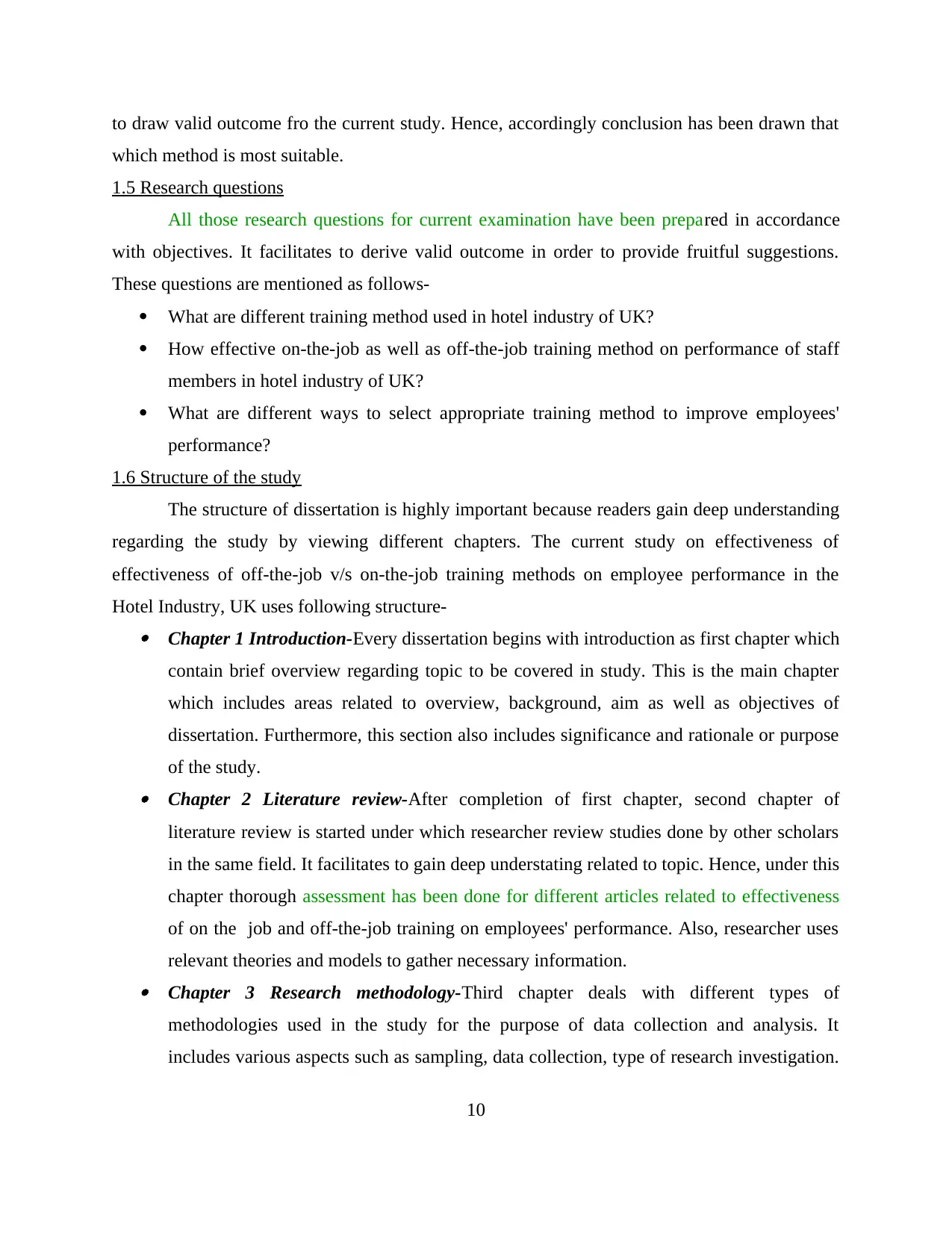
to draw valid outcome fro the current study. Hence, accordingly conclusion has been drawn that
which method is most suitable.
1.5 Research questions
All those research questions for current examination have been prepared in accordance
with objectives. It facilitates to derive valid outcome in order to provide fruitful suggestions.
These questions are mentioned as follows-
What are different training method used in hotel industry of UK?
How effective on-the-job as well as off-the-job training method on performance of staff
members in hotel industry of UK?
What are different ways to select appropriate training method to improve employees'
performance?
1.6 Structure of the study
The structure of dissertation is highly important because readers gain deep understanding
regarding the study by viewing different chapters. The current study on effectiveness of
effectiveness of off-the-job v/s on-the-job training methods on employee performance in the
Hotel Industry, UK uses following structure- Chapter 1 Introduction-Every dissertation begins with introduction as first chapter which
contain brief overview regarding topic to be covered in study. This is the main chapter
which includes areas related to overview, background, aim as well as objectives of
dissertation. Furthermore, this section also includes significance and rationale or purpose
of the study. Chapter 2 Literature review-After completion of first chapter, second chapter of
literature review is started under which researcher review studies done by other scholars
in the same field. It facilitates to gain deep understating related to topic. Hence, under this
chapter thorough assessment has been done for different articles related to effectiveness
of on the job and off-the-job training on employees' performance. Also, researcher uses
relevant theories and models to gather necessary information. Chapter 3 Research methodology-Third chapter deals with different types of
methodologies used in the study for the purpose of data collection and analysis. It
includes various aspects such as sampling, data collection, type of research investigation.
10
which method is most suitable.
1.5 Research questions
All those research questions for current examination have been prepared in accordance
with objectives. It facilitates to derive valid outcome in order to provide fruitful suggestions.
These questions are mentioned as follows-
What are different training method used in hotel industry of UK?
How effective on-the-job as well as off-the-job training method on performance of staff
members in hotel industry of UK?
What are different ways to select appropriate training method to improve employees'
performance?
1.6 Structure of the study
The structure of dissertation is highly important because readers gain deep understanding
regarding the study by viewing different chapters. The current study on effectiveness of
effectiveness of off-the-job v/s on-the-job training methods on employee performance in the
Hotel Industry, UK uses following structure- Chapter 1 Introduction-Every dissertation begins with introduction as first chapter which
contain brief overview regarding topic to be covered in study. This is the main chapter
which includes areas related to overview, background, aim as well as objectives of
dissertation. Furthermore, this section also includes significance and rationale or purpose
of the study. Chapter 2 Literature review-After completion of first chapter, second chapter of
literature review is started under which researcher review studies done by other scholars
in the same field. It facilitates to gain deep understating related to topic. Hence, under this
chapter thorough assessment has been done for different articles related to effectiveness
of on the job and off-the-job training on employees' performance. Also, researcher uses
relevant theories and models to gather necessary information. Chapter 3 Research methodology-Third chapter deals with different types of
methodologies used in the study for the purpose of data collection and analysis. It
includes various aspects such as sampling, data collection, type of research investigation.
10
Paraphrase This Document
Need a fresh take? Get an instant paraphrase of this document with our AI Paraphraser
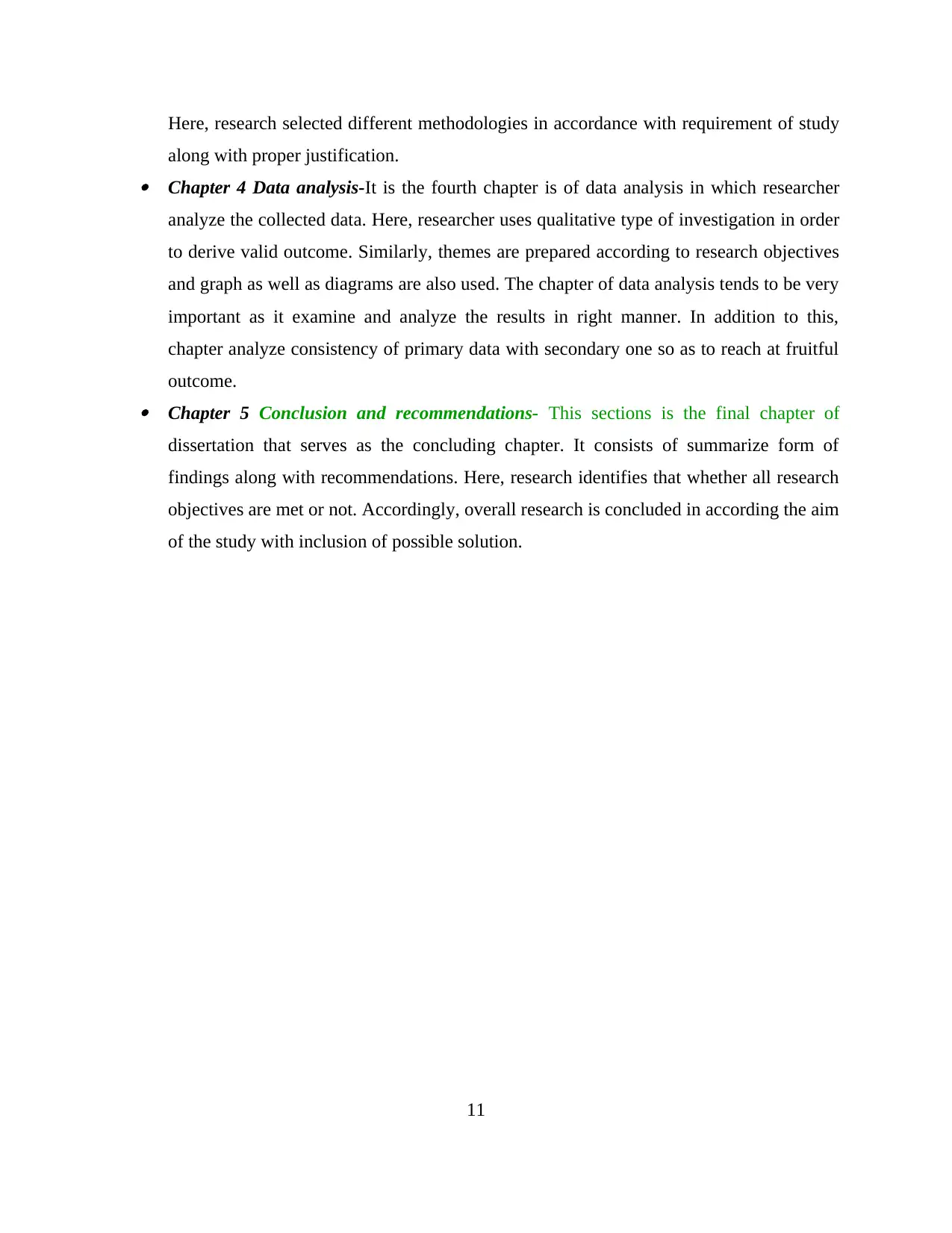
Here, research selected different methodologies in accordance with requirement of study
along with proper justification. Chapter 4 Data analysis-It is the fourth chapter is of data analysis in which researcher
analyze the collected data. Here, researcher uses qualitative type of investigation in order
to derive valid outcome. Similarly, themes are prepared according to research objectives
and graph as well as diagrams are also used. The chapter of data analysis tends to be very
important as it examine and analyze the results in right manner. In addition to this,
chapter analyze consistency of primary data with secondary one so as to reach at fruitful
outcome. Chapter 5 Conclusion and recommendations- This sections is the final chapter of
dissertation that serves as the concluding chapter. It consists of summarize form of
findings along with recommendations. Here, research identifies that whether all research
objectives are met or not. Accordingly, overall research is concluded in according the aim
of the study with inclusion of possible solution.
11
along with proper justification. Chapter 4 Data analysis-It is the fourth chapter is of data analysis in which researcher
analyze the collected data. Here, researcher uses qualitative type of investigation in order
to derive valid outcome. Similarly, themes are prepared according to research objectives
and graph as well as diagrams are also used. The chapter of data analysis tends to be very
important as it examine and analyze the results in right manner. In addition to this,
chapter analyze consistency of primary data with secondary one so as to reach at fruitful
outcome. Chapter 5 Conclusion and recommendations- This sections is the final chapter of
dissertation that serves as the concluding chapter. It consists of summarize form of
findings along with recommendations. Here, research identifies that whether all research
objectives are met or not. Accordingly, overall research is concluded in according the aim
of the study with inclusion of possible solution.
11
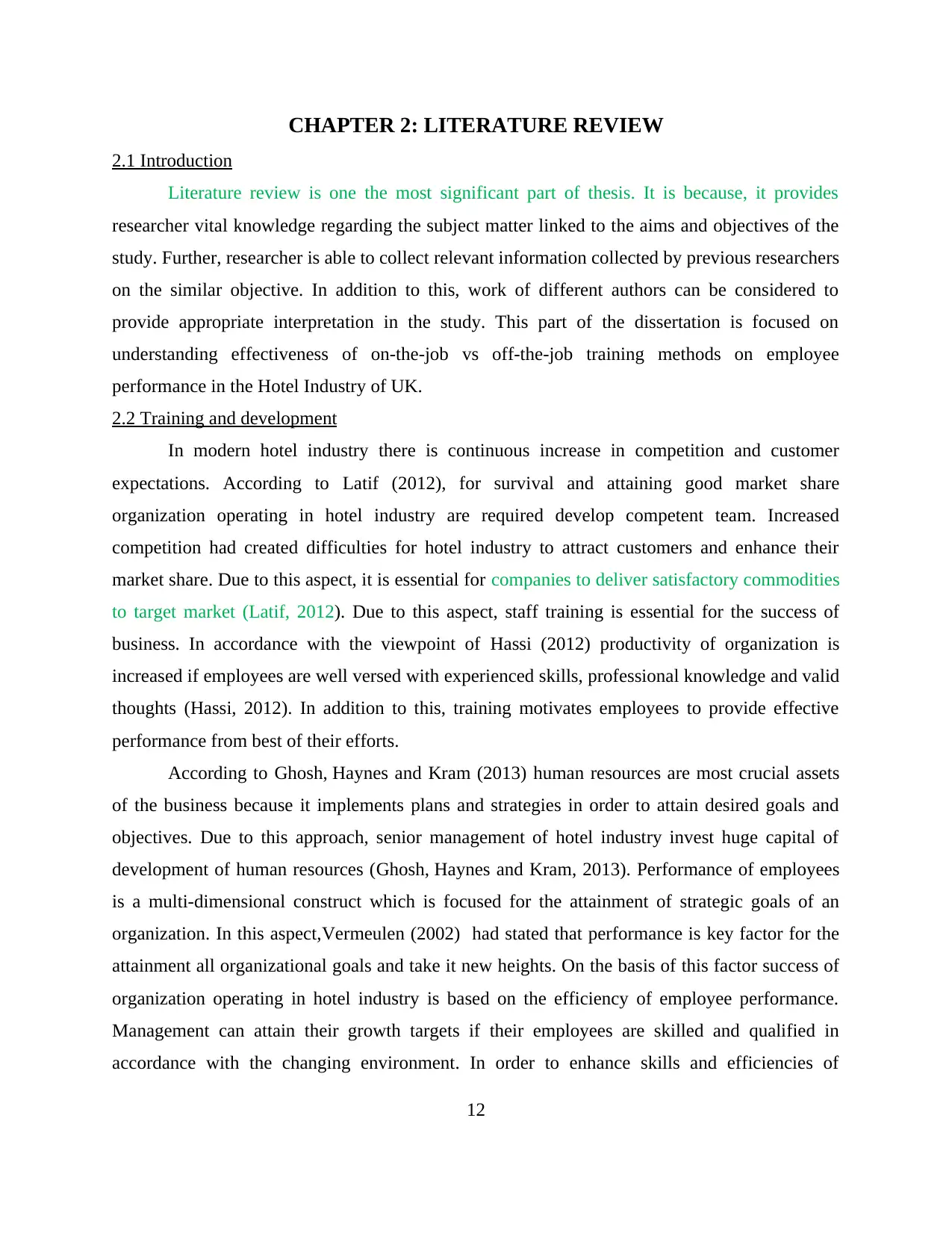
CHAPTER 2: LITERATURE REVIEW
2.1 Introduction
Literature review is one the most significant part of thesis. It is because, it provides
researcher vital knowledge regarding the subject matter linked to the aims and objectives of the
study. Further, researcher is able to collect relevant information collected by previous researchers
on the similar objective. In addition to this, work of different authors can be considered to
provide appropriate interpretation in the study. This part of the dissertation is focused on
understanding effectiveness of on-the-job vs off-the-job training methods on employee
performance in the Hotel Industry of UK.
2.2 Training and development
In modern hotel industry there is continuous increase in competition and customer
expectations. According to Latif (2012), for survival and attaining good market share
organization operating in hotel industry are required develop competent team. Increased
competition had created difficulties for hotel industry to attract customers and enhance their
market share. Due to this aspect, it is essential for companies to deliver satisfactory commodities
to target market (Latif, 2012). Due to this aspect, staff training is essential for the success of
business. In accordance with the viewpoint of Hassi (2012) productivity of organization is
increased if employees are well versed with experienced skills, professional knowledge and valid
thoughts (Hassi, 2012). In addition to this, training motivates employees to provide effective
performance from best of their efforts.
According to Ghosh, Haynes and Kram (2013) human resources are most crucial assets
of the business because it implements plans and strategies in order to attain desired goals and
objectives. Due to this approach, senior management of hotel industry invest huge capital of
development of human resources (Ghosh, Haynes and Kram, 2013). Performance of employees
is a multi-dimensional construct which is focused for the attainment of strategic goals of an
organization. In this aspect,Vermeulen (2002) had stated that performance is key factor for the
attainment all organizational goals and take it new heights. On the basis of this factor success of
organization operating in hotel industry is based on the efficiency of employee performance.
Management can attain their growth targets if their employees are skilled and qualified in
accordance with the changing environment. In order to enhance skills and efficiencies of
12
2.1 Introduction
Literature review is one the most significant part of thesis. It is because, it provides
researcher vital knowledge regarding the subject matter linked to the aims and objectives of the
study. Further, researcher is able to collect relevant information collected by previous researchers
on the similar objective. In addition to this, work of different authors can be considered to
provide appropriate interpretation in the study. This part of the dissertation is focused on
understanding effectiveness of on-the-job vs off-the-job training methods on employee
performance in the Hotel Industry of UK.
2.2 Training and development
In modern hotel industry there is continuous increase in competition and customer
expectations. According to Latif (2012), for survival and attaining good market share
organization operating in hotel industry are required develop competent team. Increased
competition had created difficulties for hotel industry to attract customers and enhance their
market share. Due to this aspect, it is essential for companies to deliver satisfactory commodities
to target market (Latif, 2012). Due to this aspect, staff training is essential for the success of
business. In accordance with the viewpoint of Hassi (2012) productivity of organization is
increased if employees are well versed with experienced skills, professional knowledge and valid
thoughts (Hassi, 2012). In addition to this, training motivates employees to provide effective
performance from best of their efforts.
According to Ghosh, Haynes and Kram (2013) human resources are most crucial assets
of the business because it implements plans and strategies in order to attain desired goals and
objectives. Due to this approach, senior management of hotel industry invest huge capital of
development of human resources (Ghosh, Haynes and Kram, 2013). Performance of employees
is a multi-dimensional construct which is focused for the attainment of strategic goals of an
organization. In this aspect,Vermeulen (2002) had stated that performance is key factor for the
attainment all organizational goals and take it new heights. On the basis of this factor success of
organization operating in hotel industry is based on the efficiency of employee performance.
Management can attain their growth targets if their employees are skilled and qualified in
accordance with the changing environment. In order to enhance skills and efficiencies of
12
⊘ This is a preview!⊘
Do you want full access?
Subscribe today to unlock all pages.

Trusted by 1+ million students worldwide
1 out of 69
Related Documents
Your All-in-One AI-Powered Toolkit for Academic Success.
+13062052269
info@desklib.com
Available 24*7 on WhatsApp / Email
![[object Object]](/_next/static/media/star-bottom.7253800d.svg)
Unlock your academic potential
Copyright © 2020–2026 A2Z Services. All Rights Reserved. Developed and managed by ZUCOL.





